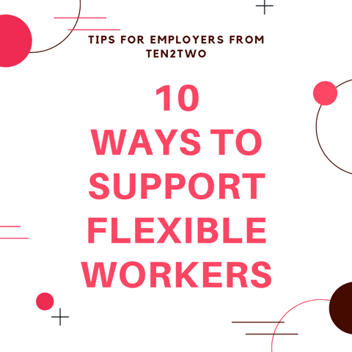How employers can support carers’ rights at work
It’s Carers’ Rights Day on 21st November 2019. As a flexible and part-time recruiter, we know that carers need flexible working, as well as working mums and dads. And with an ageing population, it’s not an issue that’s set to go away any time soon.
When you support carers’ rights at work, your business stands to benefit. Not only will you retain older, more experienced employees, but you’ll see a reduction in absenteeism, reduced staff turnover and increased loyalty and engagement.
So if you’re seeking to attract and retain diverse talent, it’s worth looking at how your workplace can be more open to employees who need to focus on their work-life balance. Employers should keep in mind the challenges faced by employees who are carers – and Carers’ Rights Day 2019 is a good time to start.
The sandwich generation of carers
Carers’ Rights Day is the ideal time for HR Managers and employers to consider employee retention and mental wellbeing. In fact, Aviva tells us that a fifth of over-45s expect to leave work to become carers, with women being largely responsible for these caring duties.
Carer’s UK says that one in seven people are juggling work with unpaid caring. That’s a massive amount of skilled workers who need to be encouraged to stay in the workplace.
In addition, as people have children later in life, employees are increasingly faced with looking after children under the age of sixteen and ageing parents. This ‘sandwich generation’ is becoming strained and set to fall out of the workplace without the right support from their bosses.
According to People Management, Claire McCartney, Senior Resourcing and Inclusion Adviser. CIPD, said that despite the number of carers in the UK set to grow from six million to nine million in the next 30 years, many workplaces were not prepared for the potential challenges that lay ahead.
How to support carers’ rights at work
Here are a few tips for employers:
1. Know your rights as an employer
When it comes to supporting staff who are carers, employers need to be aware of their employees’ rights in the workplace. If an employee has been employed continuously for 26 weeks, they can make a flexible working request. The law gives staff the chance to make a flexible working request just once a year. You have a right to turn it down as an employer but you need to have very good reasons why.
2. Know the rules about unpaid leave
From day one, employees have the right to take time off to care for dependents including children, parents or someone else who depends on the employee. This is to help them cope with unexpected situations such as a breakdown in the care of a dependent. This time off doesn’t have to be paid but you can use your judgement around this. Learn more here.
3. Know the situation may change
Sometimes, a worker’s home-life situation can alter, and employees may wish to increase their hours again in the future. The key is to be flexible when it is required – it might not be forever, so be prepared for that. When you truly listen to employees, you will retain talent and save on recruitment costs down the line.
4. Put a caring policy into place
If you can anticipate the challenges that carers face in the world of employment, you can take some of the stress from their shoulders. By implementing a caring policy, you can put into writing your expectations of employees in this situation. Successful businesses such as Centrica and Aviva have put this at the heart of their talent and inclusion policies.
5. Raise awareness in the office
As an employer, you can arrange for health or charity professionals to come into the organisation to talk to staff. This could be valuable as it could be the only time ‘sandwich carers’ can get to talk to someone about their own wellbeing and issues they might be facing.
6. Train your managers
It’s important to ensure line managers know how best to support carers in the workplace. They may need time off at short notice so a level of flexibility is required. Managers need to know what the company policy is and how to place trust in employees to work effectively around their commitments.
If you’d like to learn more about hiring flexible workers in order to boost diversity in your workplace and better support carers’ rights at work, please contact our flexible and part-time recruitment agency. We offer consultancy around implementing flexible working practice in businesses large and small.
Alternatively, if you’re an employee who needs flexibility but is failing to get it in your current workplace, please register with us today. This Carers’ Rights Day, let’s aim to change the world of work for the better.


 Back to resources
Back to resources 4 min read
4 min read








